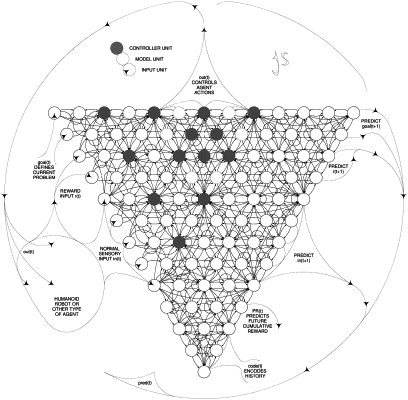| CPC G06N 3/08 (2013.01) [G06N 3/044 (2023.01)] | 23 Claims |

|
21. A method comprising:
providing a computer system that comprises a computer-based processor, a computer-based memory;
performing an initialization step wherein the computer-based processor accesses a present version of a trained a recurrent neural network (RNN), current weights for the trained RNN, positive real-valued variables that define one or more search time budgets for use in a training process for the version of trained the RNN, and a new control task description from a set of possible task descriptions, wherein the trained RNN has been trained to perform a plurality of tasks;
producing a copy of the trained version of the RNN;
producing an untrained version of the RNN, wherein the untrained version of the RNN has not been trained to perform any tasks;
applying trial-based black box optimization processes to at least some of the weights in the copy of the trained version of the RNN and in the untrained version of the RNN, while allocating a finite amount of time defined in one or more of the search time budgets for solving a new task with the copy of the trained version of the RNN and the untrained version of the RNN;
concluding that the new task has been solved if at least one of either the copy of the trained version of the RNN or the untrained version of the RNN has solved 44e a task sufficiently well, wherein, if the task or solution is deterministic, such that trials are repeatable exactly, then the computer system concludes that the task has been solved sufficiently well, if either the copy of the trained version of the RNN or the untrained version of the RNN has solved the task at least once, and wherein, if the task or solution is not determinative and there is some variability in trial outcomes even when successful, then the computer system concludes that the task has been learned sufficiently well if trial results satisfy a predetermined criteria;
terminating an attempt to solve the new task if the finite amount of time defined in one or more of the search time budgets has been expended and the system, using the copy of the trained version of the RNN and the untrained version of the RNN, has not yet solved the new task, and then checking to see if there are any other new tasks that need to be solved in a database;
if another new unsolved task is identified in the database, then producing a second copy of the trained version of the RNN, producing a second untrained version of the RNN; and applying trial-based black box optimization processes to at least some of the weights in the copy of the second trained version of the RNN and in the second untrained version of the RNN.
|